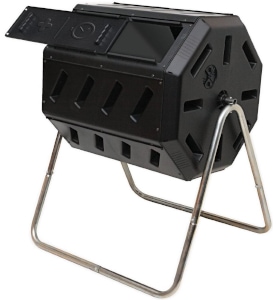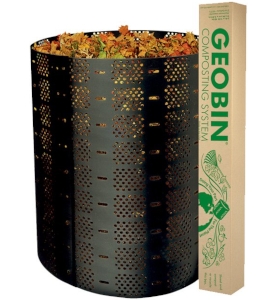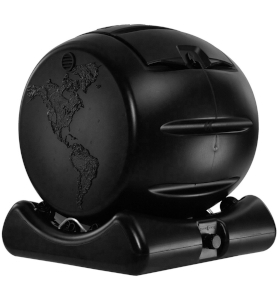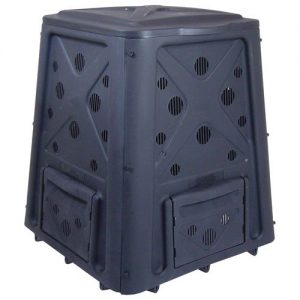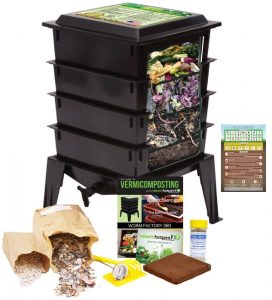The Best Compost Bins for Small Gardens
The Best Compost Bins for Small Gardens, Patios & Balconies
Having a compost bin in a small garden or yard may sound like messy work to many, invoking thoughts of a smelly garbage pile rotting away in the corner of your yard.
However, modern, well maintained compost bins actually don’t smell and they provide the perfect opportunity to provide the nutrients needed to turbocharge your small garden’s growth.
Using organic compost in your garden can boost the size of your vegetables, and enhance the beauty of your rose bushes.
It’s also a great way of keeping organic matter out of landfill. The U.S. Environmental Protection Agency states that composting your garden and kitchen waste can help to reduce the amount sent to landfill by up to 24%!
So, how do you get started composting when you’re working with a small area?
We’ve reviewed the best composters for small gardens so you don’t have to pile garden and kitchen waste in a heap in the corner of your yard!
When you buy products through the links on this site we may earn an affiliate commission. Learn more
FCMP IM4000 Tumbling Composter
The Best Overall Compost Bin for Small Gardens
While the Geobin is ideal as a “no-frills” composter, gardeners looking for a “user-friendly” composter should consider the small but mighty FCMP tumbling composter for their small garden.
Tumbling composters eliminate the need for you to go digging around in the chamber of the composter to mix your compost and ensure you have an even rate of decomposition in the organic material.FCMP IM4000 Tumbling Composter Review
With the FCMP tumbling composter, you never have to worry about sticking your hands inside the unit. Add your waste to one of the two side-by-side chambers, and turn the handle five to six times a few times a week.
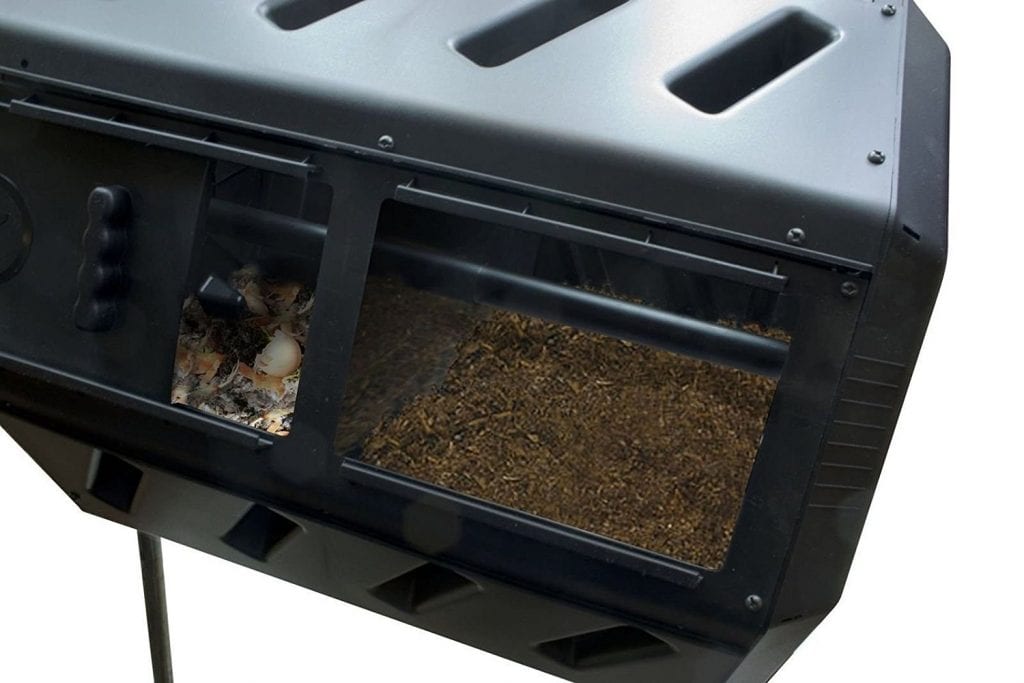
The dual chamber allows you to leave one side to cook after filling, while you add organic waste to the second chamber. As a result, you always have a fresh batch of nutrient-rich compost ready to spread in your garden. The continuous action of the tumbler allows you to have a finished batch of compost in as little as 2-weeks!
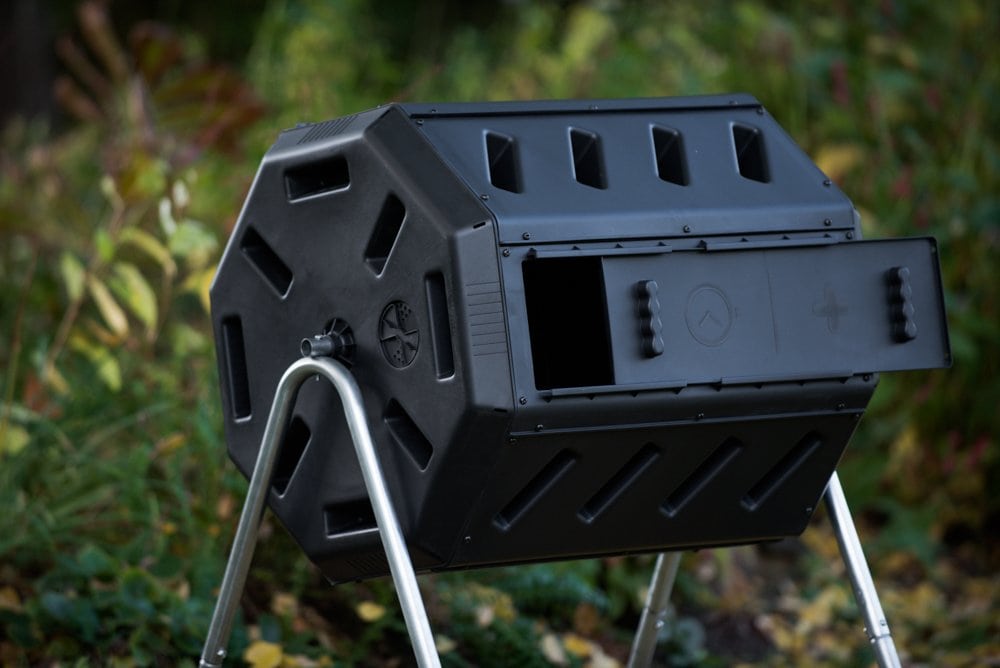
The tumbler also comes with adjustable air-vents that provide optimal aeration to the decomposing waste. The plastic body of the composter is BPA-free, featuring UV-inhibited recycled polypropylene construction. We found no issues with the turning arm locking, and the frame is sturdy enough to support the weight of a full compost box.
A dual chamber allows you to leave one side to cook while you add organic matter to the other.
The FCMP compost tumbler can hold 18.5-gallons of waste in each chamber, creating a total of 37-gallons of compost. The unit measures in at 36 x 30 x 28-inches, making this composter ideal for small to medium sized gardens. We love the high chamber sitting on a durable aluminum frame, preventing insects from attacking the compost while allowing any excess rainwater to drain quickly from the unit.
GEOBIN Compost Bin
The Best Budget Compost Bin for Small Gardens
For gardeners looking for a simple and effective composter for their small garden, we recommend that you take a look at the Geobin.
Composters don’t come in a more straightforward design, and after unboxing the Compost Bin by Geobin, you’ll understand why.GEOBIN Compost Bin Review
We think this composter is the cleanest design available, at the lowest cost. The unit comes as a roll of sheet plastic, featuring perforations cut out of the sheet to optimize airflow. Pull the Geobin composter out of the box and secure it with five interlocking plastic keys and start filling it up!
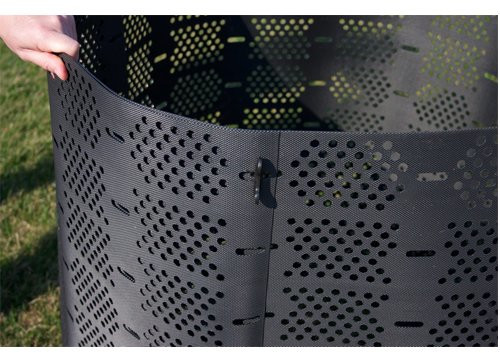
Just pull the Geobin out of the box, secure it with five interlocking plastic keys, and start filling it up!
It’s easy to fill the Compost Bin by Geobin, and just as easy to empty it when it’s time to spread your compost. However, we recommend that you keep this bin off of the ground, and under a sheltered corner of your garden. Open composters are a haven for bugs that may end up infesting your crops. Keeping the bin off the ground reduces the chance of insect infestation.
When it comes to size, the Geobin expands up to 3.75-feet in length, holding up to 216-gallons of organic garden waste. With a footprint measuring in at less than 1.5-feet in diameter, the Geobin will fit snugly into the corner of a small garden or yard and its unique design means it can be disassembled, rolled up and hidden away when not in use.
The Geobin comes ready to assemble in minutes, and a few twists of the locking keys is all it takes to set it up. The durable plastic materials used in the construction of the unit means that this composter will provide years of service life.
Envirocycle Mini Composting Tumbler
The Best Compost Bin for a Patio or Balcony
For gardeners living in an apartment and tending a container garden or potted plants, the Envirocycle is the neatest and most stylish composter.
This attractive tumbler style compost bin is available in black or hot pink, for gardeners concerned with both style and function.
Envirocycle Mini Composting Tumbler Review
The neat appearance of the Envirocycle is perfect for a small studio balcony, without it becoming an eyesore. We love the functionality of this composter, as it provides both compost and compost tea for your plants.
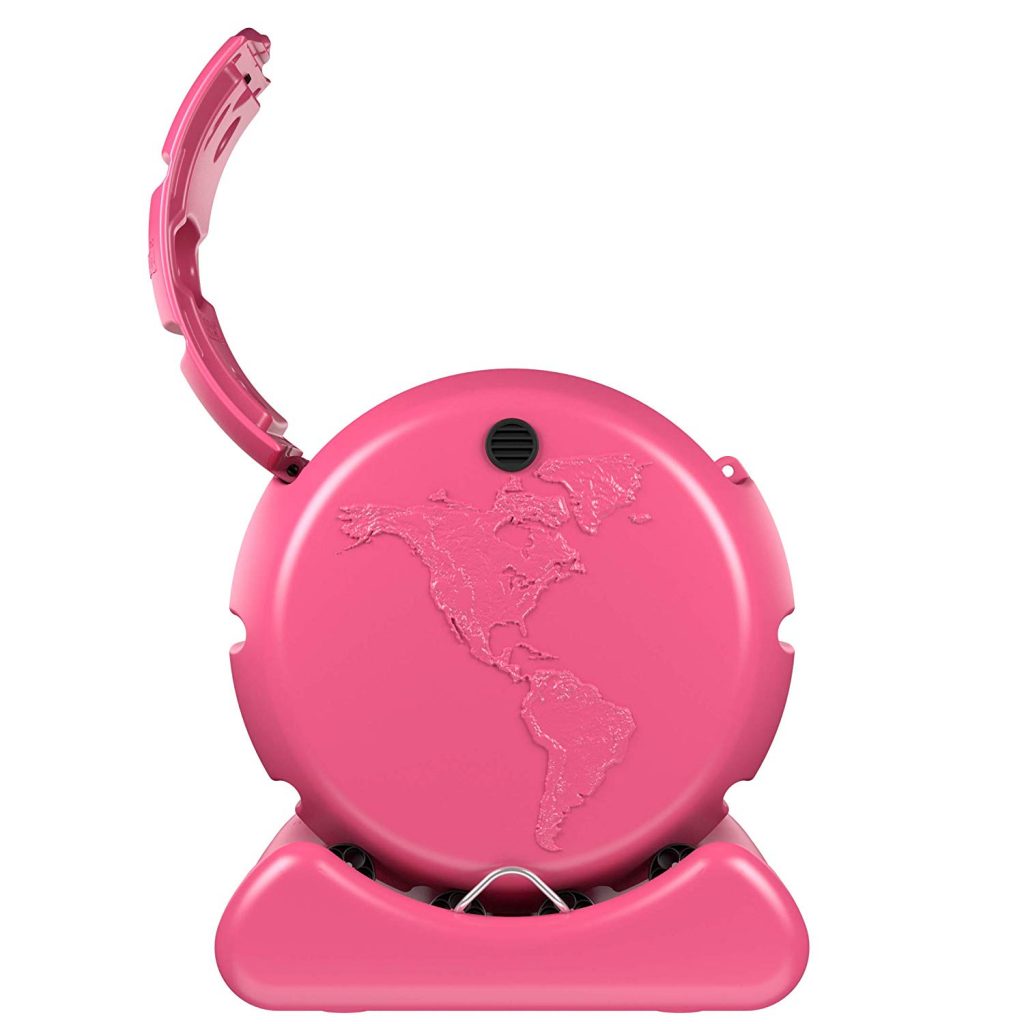
The Envirocycle is one of the smallest composters available making it ideal for apartment gardens and smaller growing spaces.The only downside of the Envirocycle composter is the price. However, if you live in an upmarket area then the price tag is worth every penny when you consider the design of the unit. The Envirocycle Mini is made in the United States, and come fully assembled, ready for your first batch of compost material so no complex set up is required. The Envirocycle holds up to 17-gallons of compost at a time. While this makes it the smallest composter in this review, we think it’s all you need for a small balcony garden or a few patio plants. This compact composter measures in at 19 x 18.8 x 21.5 inches, giving it one of the smallest footprints in this review. The small size of the Envirocycle makes it ideal for apartment gardens and smaller growing spaces. The Envirocycle features construction with BPA-free plastics, and we experienced no durability issues with the rolling mechanism or the turning arm.
Redmon Green Culture Compost Bin
Step into the backyard of most well maintained gardens and you’ll most likely find an enclosed compost bin. These are the most common type of composters available, and they work with a variety of organic waste and kitchen scraps.
Most are far too big and bulky for tiny yards and would look out of place on a small patio area. The Redmon Green Culture Compost Bin however features a sturdy design and excellent airflow to enhance the composting effect all in a compact footprint of 31 x 26.5 x 5-inches. It may be on the large size compared to the other composters we’ve reviewed, but the Redmon composter will fit into the corner of even a smaller garden – neatly out of the way.
This composter works by adding your material to the top of the bin until the composter is near full. The base of the unit has four adjustable doors that allow you to pull the decaying compost from the bottom first. Using this composter, you can expect three to four compost harvests to add to your garden each season.
The only drawback to this unit is that it stands directly on the ground. We recommend you raise it off of the floor using a pallet or a suitable stand as this will help to prevent an infestation of insects or rodents. This Redmon is constructed from high-impact, UV-resistant plastic meaning this rugged, weather-resistant composter will last you a long time.
Worm Factory 360 Worm Composting Bin
Many gardeners will know about the benefits of adding worm castings to your soil. Castings are some of the most nutrient-dense fertilizer available, and they are a must-have ingredient to the soil mix of any small veggie garden.
Worm compost not only provides superior nutrition to plants compared to regular compost, but also can help prevent pathogens and infections that may damage or kill your plants and seedlings.
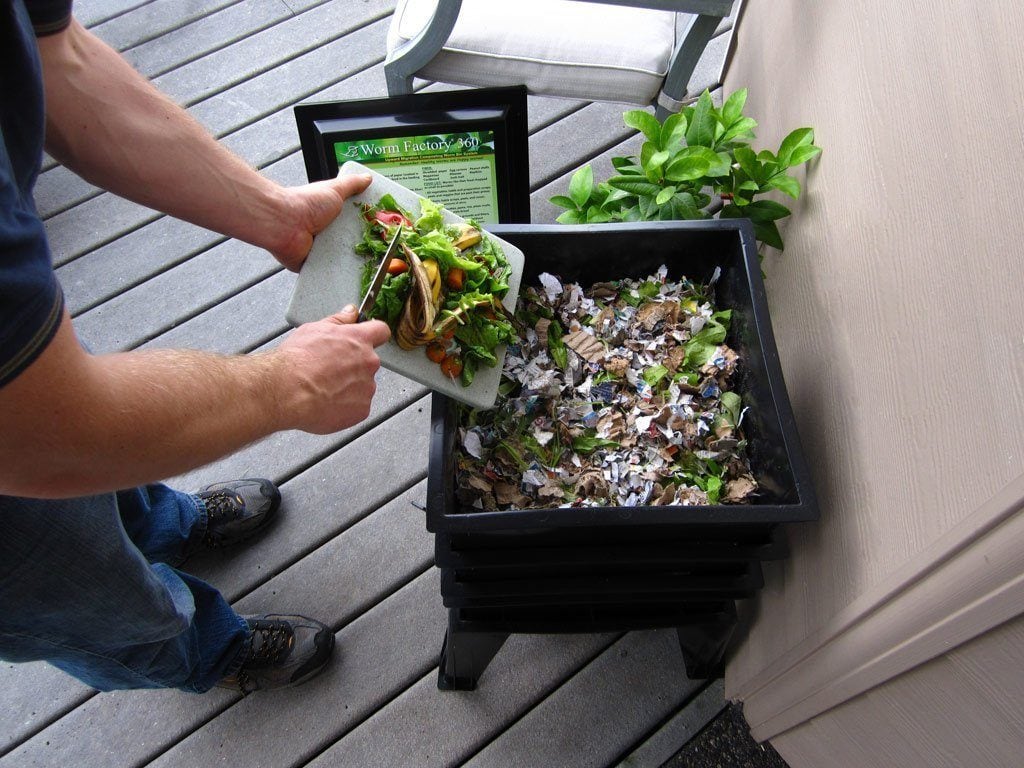
Worms will make short work of your kitchen scraps and organic waste, accelerating the decomposition process. For more information about vermicomposting read our review of the best worm composters.
The Worm Factory 360 features a 4-tray system, expanding to 8-trays if needed. It’s remarkably easy to set up the worm farm, and you’ll only need 15-minutes to maintain your composter each week. Get your farm started by working out the correct number of worms to add with a worm density calculator along with some bedding material, kitchen scraps and organic waste.
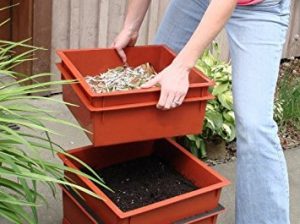
After filling the bottom tray, add another on top, and your worms will travel to the new level to seek out the latest source of food. Once all the levels are full, remove the bottom one and keep cycling the trays to ensure you have a steady supply of nutrient-rich fertilizer for your small garden.
With a tiny footprint of just 18.2 x 18 x 15.2-inches the Worm Factory will produce plenty of compost for a small yard. We also love the added bonus of the worm-tea collector at the bottom of the unit. Just turn on the spigot and collect the worm juice, dilute it with water and use as a super potent source of nutrients!
Buying Guide
When choosing your composter, it’s not just your budget you need to think about. You need to find a bin that suits the size of your garden, looks good, and produces an appropriate amount of compost. There are also a few design features to take into consideration as well. Here is what you should think about when picking the perfect composter for your small garden:
Carefully consider the size of your garden, how much organic waste you produce, and how much compost you’ll need when choosing your compost bin.
Materials
Most commercially available composters feature a black, plastic construction. The color of the composter helps to absorb heat from the sun, accelerating the decomposition of organic materials, while helping to lock in moisture.
We prefer using plastic over wooden composters because wood does not absorb heat as efficiently as plastic. Wood also tends to rot if not appropriately treated, whereas UV-resistant plastic should last a long time before becoming brittle.
If you choose a wooden compost bins make sure the wood isn’t chemically treated as these harmful chemicals may leach into your compost and the veggies in your garden.
Shape and Design
Modern composters usually come in a circular shape to avoid the “cold-spots” you find in the corners of a square bin. These low-temperature areas are mean that your organic waste and kitchen scraps decompose slower than the waste in the center.
Ventilation and Airflow
The micro-organisms responsible for breaking down the organic matter in your composter require plenty of fresh air to optimize the composting effect. If your composter does not receive sufficient airflow, then you are likely to wind up with a slowly decomposing mess!
Size
Choose your composter size to suit the amount of waste your garden produces over the season. Larger bins require more work to turn the compost as it decays, while smaller containers are easier to manage. However, small bins dry out faster and have a higher sensitivity to environmental conditions.
Maintenance
Some composter models are easier to manage than others. In most cases, you’ll need to work the compost with a pitchfork every other week to ensure even decay of the organic matter. However, the tumbling or rotating models allow for easy turning of the compost, without the need for garden tools.

